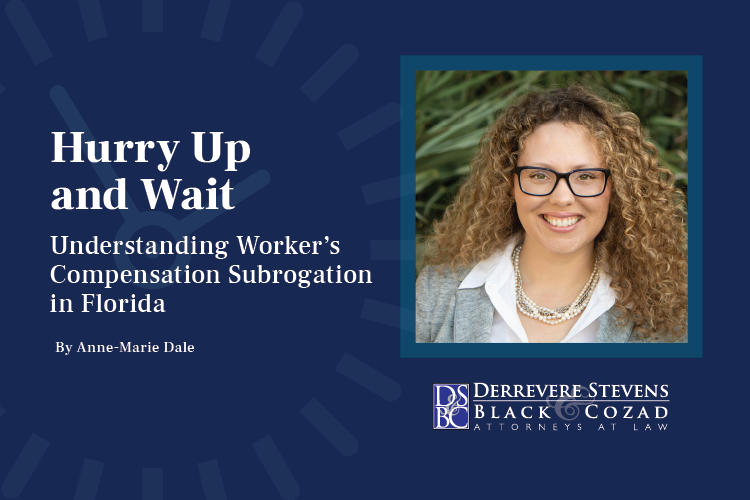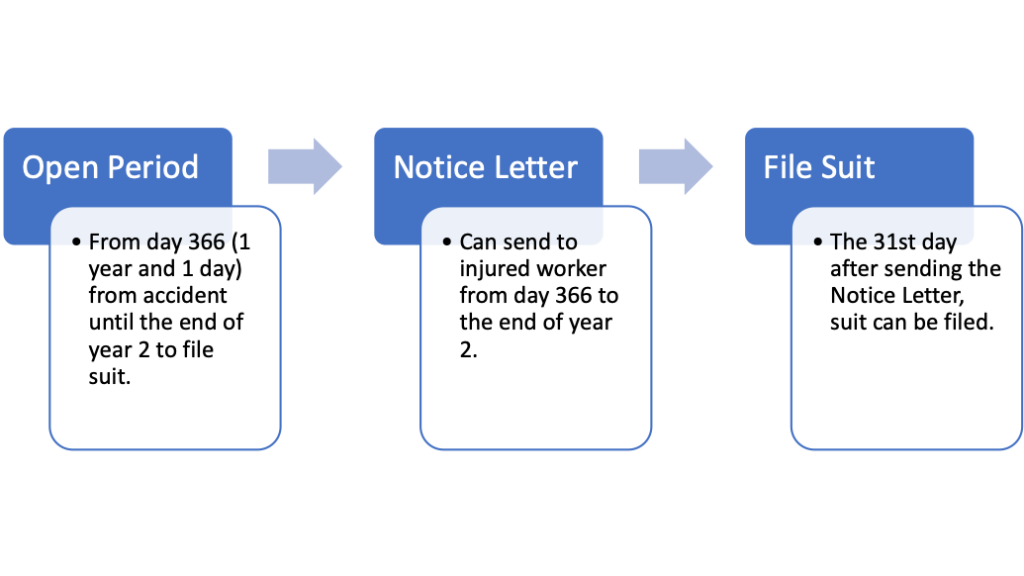Hurry Up and Wait

Understanding Worker’s Compensation Subrogation in Florida
Subrogation and workers compensation, together, normally are not a topic of conversation at many events or family gatherings. However mundane as it sounds, if you are a workers’ compensation carrier or injured worker, you may want to learn more as Florida law allows for other parties, not just the injured worker, to recover from the third-party who caused the injury.
Look no further than to Fla. Stat. §440.39 – Compensation for injuries when third persons are liable. In a nutshell, this section of the Florida worker’s compensation statute details the process for who, how, and when a party, whether or not it is the injured worker, can file a lawsuit to recover medical benefits as well as past and future compensation benefits from the third-party liable for the injury. It is commonplace that when an employee is injured “on the job,” a workers’ compensation claim is set up through their employer’s insurance carrier. What about the workers compensation carrier itself, what rights, if any, do they have to pursue the at fault party?
TIMING, by far, is the most important aspect of this section of the workers’ compensation statute. When trying to understand what rights worker compensation carriers have, §440.39(4)(a) is your one stop shop. This section of the statute allows for the workers compensation carrier to file suit and step in front of the injured worker by taking rights to all claims. This process can only occur once 365 days have passed from the accident. Once this time frame has come and gone, the door is open for the workers’ compensation carrier to file suit. However, TIMING, again, plays a large part in preserving the workers compensation carrier’s right to the lawsuit.
There are a few conditions that the workers compensation carrier must complete before suit is filed. First, the carrier has to properly notify the injured worker and the injured workers attorney, if one is known, of the carrier’s right to file suit against the third-party. In order for the carrier to proceed, they have to wait until day 366 from the injury. If day 366 arrives, and suit has not been filed by the injured worker or settlement has not occurred, the workers’ compensation carrier will need to send a 30-day notice letter. The notice letter should assert that the carrier will be initiating their own lawsuit against the wrong doer(s) and reference §440.39(4)(a) of the statute. This gives another opportunity for the injured worker to file suit within that 30-day period.
After the 30-days have passed since providing the Notice to the claimant and claimant’s attorney, TIMING, again, plays a large part in preserving the carrier’s rights. On the 31st day, the carrier is now able to file suit. A race to the courthouse begins. If the carrier files first, they not only own their claim but the carrier also owns the entire claim of the injured worker. However, if the injured worker gets to the courthouse first, the carrier loses their rights to stand at the front of the line for recovery.
Knowing that Florida Statute §440.39(4)(a) allows for workers’ compensation carriers to file suit against the wrong doer by following simple time and notice requirements, the carrier can have peace of mind that they are on their way to recouping medical and compensation costs from the wrong doer as well as attorney’s fees and cost for bringing the suit. If you are an insurance company that is in need of assistance with evaluating worker’s compensation cases, we are here to assist to provide information to help meet these timelines and determine if filing suit is in your companies’ best interest.
 Florida Statue 440.39 – http://www.leg.state.fl.us/statutes/index.cfm?App_mode=Display_Statute&Search_String=&URL=0400-0499/0440/Sections/0440.39.html
Florida Statue 440.39 – http://www.leg.state.fl.us/statutes/index.cfm?App_mode=Display_Statute&Search_String=&URL=0400-0499/0440/Sections/0440.39.html




